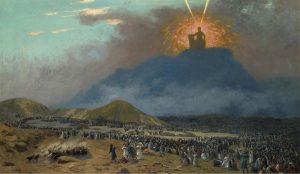 Even ancient scribes had problems with some of the laws that were decreed from the mouth of the Almighty himself. Take the commandment against idolatry thundered from Mount Sinai:
Even ancient scribes had problems with some of the laws that were decreed from the mouth of the Almighty himself. Take the commandment against idolatry thundered from Mount Sinai:
You are not to make yourself a carved-image
or any figure
that is in the heavens above, that is on the earth beneath, that is in the waters beneath the earth;
you are not to bow down to them,
you are not to serve them,
for I, YHWH your God,
am a zealous God,
calling-to-account the iniquity of the fathers upon the sons, to the third and fourth generation
of those that hate me….
(Exodus 20:4-5, Everett Fox trans)
Poor unlucky great-great-great grandchildren.
Fortunately for those innocents scribes or priests knew how to subvert God’s command.
But since they are playing with God’s own words they need to be clever enough to avoid detection.
The first rule they followed was to remain anonymous. Mustn’t make it easy for God to identify the culprit.
Just as there is not a single law in the Bible that Israelite authors do not attribute to God or his prophetic intermediary, Moses, so is the converse also true. In the entire Hebrew Bible, not a single text, legal or otherwise, is definitively attributed to the actual scribe responsible for its composition. Except for the prophets, biblical authors never speak explicitly in their own voice. Instead, they employ pseudonyms or write anonymously. Proverbs, for example, is attributed to Solomon by means of its editorial superscription (Prov. 1:1), while Ecclesiastes is similarly ascribed to “the son of David, king in Jerusalem” (Qoh. 1:1). Neither of these attributions withstands critical examination.28 Such attributions seem rather to function to lend greater authority or prestige to a literary composition by associating it with a venerable figure from the past . . . (Levinson, Bernard M. (2003). “You Must Not Add Anything to What I Command You: Paradoxes of Canon and Authorship in Ancient Israel”, Numen, 50.1, p. 15)
It was a different matter if laws were merely “man-made”. What one mortal decreed another mortal could strike out and replace. So it was, for example, with ancient Hittite laws as we see from the following case:
If anyone blinds a free person or knocks his teeth out, formerly they would pay 40 sheqels of silver, but now one pays 20 sheqels of silver. . . (Hittite Laws #7, cited in Levinson, 2003)
Inflation or the greater need to allow for knocking out the eyes and teeth of undesirables required a change in the law and it was effected as simply as the above example shows.
But one can’t be so blunt if the laws have been divinely revealed from heaven.
Before showing how the literate class managed to nullify God’s eternal words let’s see where the idea of punishing future generations originated. It did not begin with God, but God picked it up from his reading of Near Eastern treaties. Continue reading “How Bible Contradictions Began”
